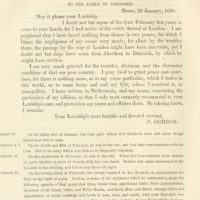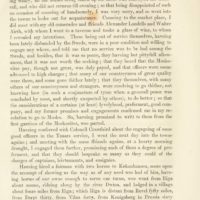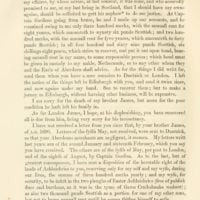
Related
![1686] DIARY OF PATRICK GORDON. 145 ffriends ; and in the evening, were merry with my Lord Dumferling](https://cdn2.picryl.com/thumbnail/1699/12/31/1686-diary-of-patrick-gordon-145-ffriends-and-in-the-evening-were-merry-with-9974ab-200.jpeg)
1686] DIARY OF PATRICK GORDON. 145 ffriends ; and in the evening, were merry with my Lord Dumferling

168 DIARY OF PATRICK GORDON. [1690 The twenty-eiglith of January
![1686] DIARY OF PATRICK GORDON. 119 lages on the road, and on both sydes](https://cdn2.picryl.com/thumbnail/1699/12/31/1686-diary-of-patrick-gordon-119-lages-on-the-road-and-on-both-sydes-f65fc6-200.jpeg)
1686] DIARY OF PATRICK GORDON. 119 lages on the road, and on both sydes

42 DIARY OF PATRICK GORDON. [1661 misfortune

138 DIARY OF PATRICK GORDON. [1686 to a coachman, to bring the trunke
![1690] DIARY OF PATRICK GORDON. 169 regiments in line three deep](https://cdn2.picryl.com/thumbnail/1699/12/31/1690-diary-of-patrick-gordon-169-regiments-in-line-three-deep-7f03ff-200.jpeg)
1690] DIARY OF PATRICK GORDON. 169 regiments in line three deep

176 DIARY OF PATRICK GORDON. [1692 just wages thrive. I think he may be summoned...

104 DIARY OF PATRICK GORDON. [1667 The following dayes, I received the visitts and gratulations of my ffriends.
![1690] DIARY OF PATRICK GORDON. 107 their arrival was announced. Gordon was at once admitted to His Majesty](https://cdn2.picryl.com/thumbnail/1699/12/31/1690-diary-of-patrick-gordon-107-their-arrival-was-announced-gordon-was-at-a59a57-200.jpeg)
1690] DIARY OF PATRICK GORDON. 107 their arrival was announced. Gordon was at once admitted to His Majesty
40 DIARY OF PATRICK GORDON. [1661 two letters by a trusty ffriend, one dated three dayes befor the tyme
Summary
Passages from the diary of General Patrick Gordon of Auchleuchries : A.D. 1635-A.D. 1699"
40 DIARY OF PATRICK GORDON. [1661
two letters by a trusty ffriend, one dated three dayes befor the tyme I had
promised to returne, giveing him notice, that, upon my comeing to Thorun,
I was fallen into a heavy sicknesse, being a hott feaver, so that I could not
be able to come at the appointed tyme, promising how soone I were re-
covered to make all possible hast ; the letter not writt by myself, but sub-
scrived ; the other letter, dated a fortnight thereafter, from the same place,
infonning his excellency that the violence of sickness was relented, but that
I was taken with a sort of a quotiduan feaver, and want of appetite, which
had weakened me, so that I was out of hopes of being able to travel in
hast, makeing a great regrait, that, by this misfortune, 1 had lost the hon-
our which I thought to have had to serve his Imperial! Majesty, and such
expressions more.
iiy 25. Haveing taken my leave of ffrlends, I crossed the river Vistula, and
novo. jQ^gg^ 'y^ ^jjg Prague all night ; and the next morning after breakfast, and a
iiy 26 merry cup with the ffriends who had convoyed us, wee began our jorney.
Colonell Crawfuird, being a prisoner to the Colonell Lord Henry Gordon,
was not only maintained by him at a plentifull table in Varso, but dismissed
ransome free, and gave him a pass for a capitaiue of horse. Captain Pawl
Menezes had a pass for a capitaine of foot. The colonell had a servant, and
I fowre, so that wee were in company but eight persons, I acting the
chiefFest by the way.
The first night wee lodged in a village fyve miles from Varso ; and the
iiy 27. next day afternoone came to Vengrova, which is twelve miles from Varso,
where wee lodged and stayed the next day, exspecting Andrew Burnet and
WilUam Guild, who had promised to go with me.
\\j 29. Wee went from hence, and, crossing the river Bug at a ruined towne
called Ostrow, wee came to Tikoczino, where is a strong castle by the river
Narew. Here is also a Jewish sinagogue, and very many Jewes. From
thence, wee went down by the river syde, and crossing the said river at
Wizna, wee lodged there. Wee crossed thereafter the river Leek, where
the Polls and Tartars beat the Sweds and Brandeburgers, and tooke Duke
Bogoslaw Radziwill prisoner ; am I comeing to Raggrod, wee dined there ;
then passing by Augustowa, Eokalarzova, and PhiUppova, where the same
Polls and Tartars were, eight dayes thereafter, beat by the Sweds and
■ Brandeburgers, and Duk Radzivill recovered. This was done, anno Domini
1656, in September.
Being come to Znin, wee lodged there all night, and were merry with
Gordon was brought up and remained a lifelong Roman Catholic, at a time when the Church was being persecuted in Scotland. At age of fifteen, he entered the Jesuit college at Braunsberg, East Prussia, then part of Poland. In 1661, after many years experiences as a soldier of fortune, he joined the Russian army under Tsar Aleksei I, and in 1665 was sent on a special mission to England. After his return, he distinguished himself in several wars against the Turks and Tatars in southern Russia. In recognition of his service he was promoted to major-general in 1678, was appointed to the high command at Kiev in 1679, and in 1683 was made lieutenant-general. In 1687 and 1689 he took part in expeditions against the Tatars in the Crimea, being made a full general. Later in 1689, a revolution broke out in Moscow, and with the troops under his command, Gordon virtually decided events in favor of Peter the Great against the Regent, Tsarevna Sophia Alekseyevna. Consequently, he was for the remainder of his life in high favor with the Tsar, who confided to him the command of his capital during his absence from Russia. In 1696, Gordon's design of a "moveable rampart" played a key role in helping the Russians take Azov. One of Gordon's convinced the Tsars to establish the first Roman Catholic church and school in Muscovy, of which he remained the main benefactor and headed the Catholic community in Russia until his death. For his services his second son James, brigadier of the Russian army, was created Count of the Holy Roman Empire in 1701. At the end of his life the Tsar, who had visited Gordon frequently during his illness, was with him when he died, and with his own hands closed his eyes. General Gordon left behind him a uniquely detailed diary of his life and times, written in English. This is preserved in manuscript in the Russian State Military Archive in Moscow. Passages from the Diary of General Patrick Gordon of Auchleuchries (1635–1699) was printed, under the editorship of Joseph Robertson, for the Spalding Club, at Aberdeen, Scotland, 1859.
